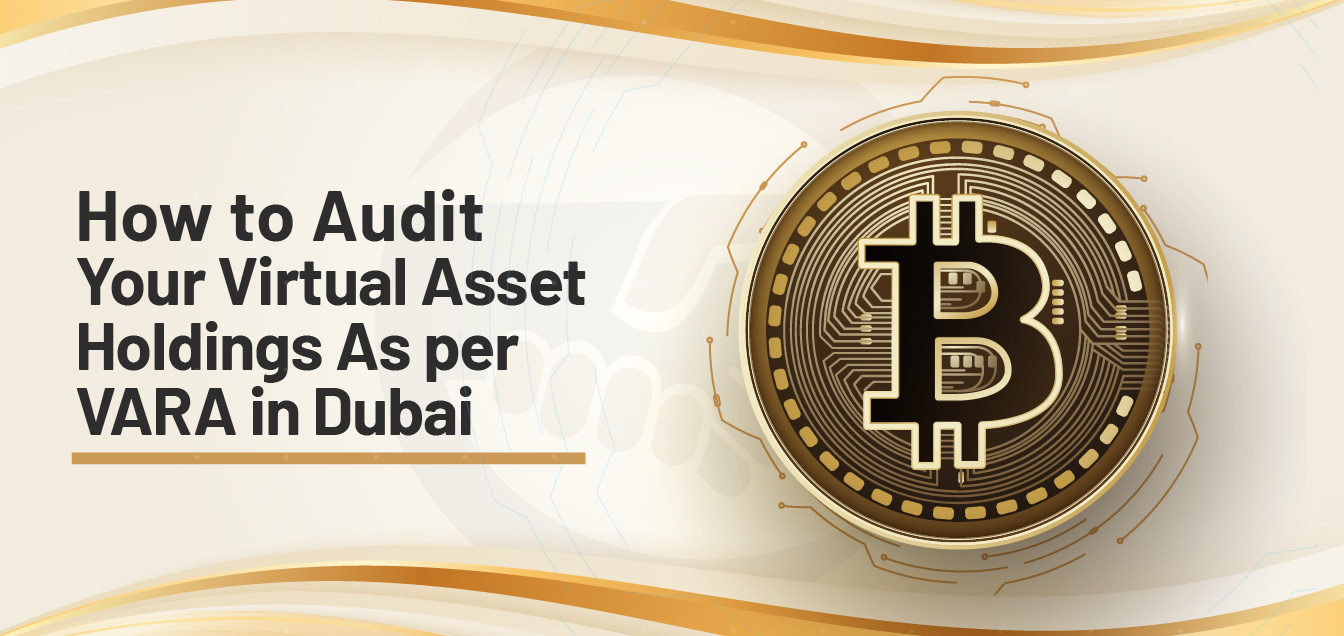
05 Nov 2024
How to Audit Your Virtual Asset Holdings As per VARA in Dubai
In the fast-evolving world of digital finance, virtual assets like cryptocurrencies have become integral to the global financial ecosystem. As a significant player in this field, Dubai has established itself as a central hub for virtual assets by creating a comprehensive regulatory framework under the Virtual Asset Regulatory Authority Dubai (VARA). Compliance with these regulations is crucial for businesses and Dubai investors dealing with cryptocurrencies and other digital assets.
A key component of this compliance is auditing your virtual asset holdings. Conducting a virtual asset audit ensures that you meet the stringent guidelines set by VARA while maintaining transparency and security in your transactions.
What is Dubai VARA?
VARA operates under the Dubai World Trade Centre Authority (DWTCA) and is the responsible entity for:
1. Regulating Virtual Assets and related activities
2. Supervising Virtual Assets and related activities
3. Overseeing Virtual Assets and related activities
VARA's jurisdiction covers all areas within the Emirate of Dubai, including Special Development and Free Zones, except the Dubai International Financial Centre (DIFC).
What is VARA?
VARA is affiliated to the Dubai World Trade Centre Authority [DWTCA] and is the competent entity in charge of regulating, supervising, and overseeing Virtual Assets and VA Activities in all zones across the Emirate of Dubai, including Special Development Zones and Free Zones but excluding the Dubai International Financial Centre
The Importance of Auditing Virtual Asset Holdings
As virtual assets gain mainstream acceptance, regulatory bodies worldwide have introduced measures to ensure they are traded and held securely. In Dubai, virtual asset audit compliance is paramount, as it helps prevent financial crimes like money laundering and terrorism financing while protecting investors from fraud.
VARA mandates strict auditing requirements for all entities engaged in digital asset transactions. The purpose of a virtual asset audit in Dubai is to validate that businesses and individuals holding virtual assets maintain accurate records, meet security standards, and follow legal procedures to prevent any breaches of the law. Moreover, regular audits help foster stakeholder confidence, proving that your business operates transparently and responsibly in the rapidly expanding digital economy.
Best Practices for Virtual Asset Auditing in Dubai
Auditing your virtual asset holdings requires following best practices that ensure compliance and transparency. Some of the best practices include:
1. Staying Updated with Regulations: As virtual asset regulations in Dubai evolve, keeping track of new updates from VARA is vital.
2. Maintaining Detailed Records: Accurate and well-maintained documentation is essential for passing an audit successfully.
3. Implementing Robust Security Protocols: Ensuring the highest level of security for your digital assets is critical for regulatory compliance and protection against cyber threats.
4. Engaging Professional Auditors: Since VARA’s audit requirements can be complex, working with professionals who understand the regulatory framework and the technical aspects of virtual assets is crucial for a successful audit.
Why Auditing Is Essential for VARA Compliance
Compliance with VARA guidelines for virtual asset audits in Dubai ensures that your digital asset holdings are transparent, secure, and legitimate. VARA, as the governing body, has a zero-tolerance policy towards non-compliance. Failure to audit your holdings properly could result in significant penalties, asset seizures, or business restrictions.
Conducting a virtual asset audit in line with VARA’s requirements demonstrates your commitment to regulatory adherence, protecting your business from legal challenges, and safeguarding your assets in a volatile market.
Audit Requirements for Virtual Asset Service Providers under VARA
External Audit
1. Virtual Asset Service Providers (VASPs) must audit their financial statements with an independent third-party auditor. They must provide VARA with the auditor's full name and contact details as soon as they are appointed.
2. The annual audit report should be accessible to clients and VARA when requested.
3. VASPs need to understand the auditor's procedures to verify the existence and ownership of Virtual Assets and confirm that their valuation is reasonable.
4. The financial information included in the annual report must be prepared according to generally accepted accounting standards.
5. If needed, VASPs must ensure that relevant counterparties cooperate with the auditor and provide all necessary information to conduct the audit.
6. VARA reserves the right to ask a VASP to appoint a different auditor if the original one is deemed unsuitable for the complexity or scale of the business or if their reputation is in question.
Internal Audit
1. VASPs must, where applicable, set up an internal audit function that operates independently of their day-to-day activities and regularly reports to Senior Management.
2. VASPs must define clear policies outlining the responsibilities and relationship between internal and external auditors.
3. The internal audit team should:
4. Perform regular audits quarterly.
5. Report findings and recommendations to Senior Management.
6. Address and resolve any issues or risks identified in the reports.
How AMCA Can Help with Auditing Your Virtual Asset Holdings As per VARA
Navigating the complexities of virtual asset audit compliance can be daunting, especially with the continuously evolving landscape of digital asset regulations. This is where AMCA comes in. As a leading firm in the UAE, we specialize in audit services, offering a thorough understanding of VARA regulations in Dubai.
Our team of experts can guide you through the entire audit process, from compliance assessments to ensuring that your transactions and records meet all regulatory standards. We leverage our deep expertise in virtual asset management and blockchain asset audit to provide the most reliable auditing services.
If you want to ensure full compliance with VARA virtual asset audit requirements, contact AMCA today. Our team is ready to assist you in safeguarding your virtual assets and ensuring that your holdings meet all regulatory standards. Don’t wait—secure your business by auditing your virtual asset holdings with AMCA now!
Read More: UAE Golden Visa Benefits: How To Get Dubai Golden Visa
Read More: Top 8 Audit Firms in Dubai
Read More: Bookkeeping Tips for Startups to Maintain Positive Cash Flow
Read More: The Essential DIFC List of Auditors: Ensuring Financial Transparency and Compliance

.jpg)

.jpg)
